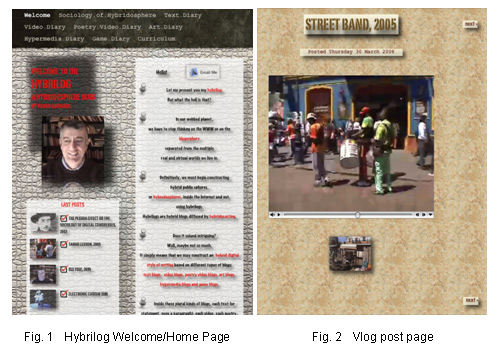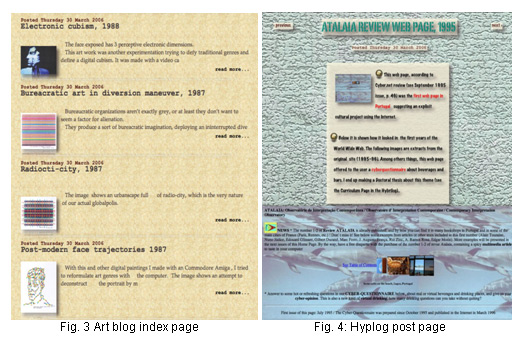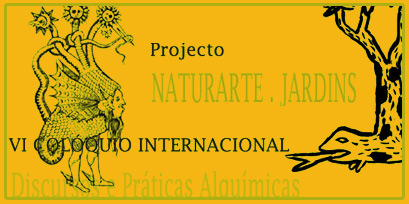
PEDRO ANDRADE
A sub-version of writing and of citizenship:
the blog’s auto-writing and the hybrilog as trans-writing
1. The blog’s auto-writing and the citizenship’s public space
We all know that a blog is a diary diffused in the Internet. However, sometimes we may understand a blog as a type of biography of the blog’s author. This is somewhat far from reality. The blog segregates essentially an auto-writing, which is not necessarily a biographical writing. Its differences are based at least on the following three criterions:
First criterion: the protagonist of the events narrated. The hero of the biography is an individual, that coincides with its author in the case of an auto-biography. On the contrary, the main character of the blog is the global world. The blogger doesn't necessarily speak about himself, although he/she does so often indirectly, when he is speaking about others. But the main target of the blog’s gossip are external events to its author. In other words, in the biography there is an author that tells a story or traces an History of a social actor. In the auto-biography, an author coincides with the actor of the events. And in the case of the blog, the author talks about several actors, one of them being himself.
Second criterion: the time of the events reported. The biography presupposes a past story, that is recounted in the moment of its writing, be it in the form of a biography or as an auto-biography. In a blog, we observe a mode of writing on events usually not occurred in the past, but happened and presented in the present.
Third criterion: The ‘opination’ degree. ‘Opination’ may be understood as the process of opining or emitting an opinion about an event or on a subject in discussion inside a specific conjuncture of a society or community’s life. In the biography, the faithful report of the events prevails in regard to the judgement that can be done on these events, although a judgement is always present in a biography’s writing, less or more visibly. On its side, the blog privileges the opinion, and the event is mainly a pretext for the emission of an opinion. In cyberspace, this cyberopinion is constructing a new sub-version of citizenship.
Thus, a blog builds an hybrid style, situated somewhere between the biography and the journalism. It is, therefore, a style of auto-writing about the life of the others. Or an auto-representative writing on the contemporary life. Or a common diary scribbled by our global world.
Viviane Serfaty (2004), inside the articulation among the literary criticism, the psychoanalysis and the social sciences, delineates the historical roots of this auto-representative writing in the USA, compared to the developments of the auto-writing in the Internet. The blogger’s motivations of his writing are influencing irreversibly the American society and culture. This author deals with themes like the humor in cyberspace, the dichotomy private/public and the ciber-bodyness. One of the more original and controversial digital diaries, according to Maxim Jakubowski (2005), is the set of testimonies about the sexuality of the bloggers, for example prostitutes, strippers and webcam girls.
Barb Palser is a journalist and blogger who affirms that fame is better conquered by controversy than by content. In fact, numerous blogs are criticizing Donald Rumsfeld's performance relatively to the Iraq war, according to Thomas Sumner (2005). The very essence of politics and of citizenship changes with the advent of blogosphere, as Richard Davis tells us (2005).
2. The hybrilog as trans-writing.
Nowadays, the blog phenomenon is grounded mainly on text diaries, which are published, first of all, through textcasting, that is, periodical text diffusion by the internet. Meanwhile, blogs had engendered a multitude of descendents, for instance the vlogs (Fig.2) and the plogs. In fact, video-diaries or vlogs are transmitting messages principally through video clips instead of written words, that is, through videocasting. In my perspective, plog means 'poetry blog', that is to say, a virtual poetic diary diffused world wide by poetrycasting. On its side, a 'poetry-video-blog' or, briefly, pvilog , as it distributes essentially videopoetry, has a mode of delivering posts that should be called videopoetry casting.

Furthermore, an artblog (Fig. 3) is a digital diary containing art works, and delivered in a current sequence across the net. Such a strategy of planetary dissemination of art works is named artcasting. In the same perspective, a hyplog (fig. 4) can be considered a diary that posts hypermedia regularly inside the web, circumscribing hypercasting. Finally, a gamelog signifies a type of blog that diffuses games, in a immediate or at least durable rhythm. This ubiquitous style of global game spread is denominated gamecasting.
A s a central consequence of what has been said above, we have to stop thinking in the blogosphere separated from the multiple real and virtual worlds we live in. Definitively, we must begin constructing hybrid public spheres, or hybridospheres inside the Internet, using hybrilogs (Fig.1). Producing an hybrilog allows an author to construct a blended or webbed digital style of writing, using the virtualities of different and complementary media. Conversely, a reader may experiment, in the same hybrilog, diverse kinds of media reading. The result of the multiple methods of casting we mentioned before is named hybridocasting . Thus, the blogosphere is no longer based in an unique method of blogging, and presently is being transformed deeply by the emergence of these plural modes of casting in the Internet. A major effect of this process is the birth of an inedited hybrid cyberopinion developed daily by infonauts. (see http://en.wikipedia.org/wiki/Hybrilog )
Consequently, trans-writing may be interpreted as a mode of writing that doesn’t refer for much time to a sole place, to an unique style or to a media of communication isolated from the others. This transmediatic writing, when it articultes the different media, just trans-writes, towards the space of discourse, the wider convergent dynamics that circulate in our post-fordist and post-modern societies.

The hybrilog is one of these trans-writing modes of writing. It is not a multi-writing, that is to say, a set of ways of writing that occur parallelly to one another in a text, but without maintaining strong reciprocal relationships, besides its neighborhood relation. Similarly, the trans-writing mode of expression inherent to the hybrilog is not an inter-writing, which means a group of writing styles that intersect one another in several ways or by several relationships. On the contrary, the hybrilog produces a collateral effect that, although less serious than those that the intelligent bombs exhibit, changes something in the nature of the media that the hybrilog mobilizes. In other words: the text in a blog, inside the hybrilog, is no longer just text. The video in a vlog placed inside an hybrilog, is transformed in a sort of ‘extra-video’ or post-video. The video-poetry situated inside a pvilog, this one resident in a hybrilog, is neither just video, nor only poetry, nor exclusively ‘video-exhibited’ poetry. The digital art inserted in an artblog included in a hybrilog, is a type of trans-art. The hypermedia published through a hyplog inhabitating an hybrilog, suffers from an identity crisis. And even a cybergame inserted in a hybrilog is not played by an user in the same way than a classical digital game is. I am really sorry, but cyberspace is no longer the place it used to be, nor it was perhaps the place we always thought it was.
In short, trans-writing transcends each one of the media ways of writing that compose it. Therefore, hybrilog trans-writing is becoming a more and more deeper hybrid writing, that produces something different from the summing of the several media involved in its production-diffusion. To conclude, I would say that trans-writing transforms and surmount the writing processus itself, at least as we know it presently. This new mode of writing and talking in cyberspace and in cybertime, which constitutes an inedited cyberliteracy, engenders parallelly a singular sub-version of digital citizenship.
3. Bibliography.
Davis, Richard, 2005, Politics Online: Blogs, Chatrooms, and Discussion in American Dem, Routledge.
Jakubowski, Maxim, 2005,The Mammoth Book of Sex Diaries : Online Confessions and Call-Girl Adventures--The Best of the Sex Blogs, Carroll & Graf.
Palser, Barb, 2003, Free to blog? Three journalists are told by their employers to cease their Web musings, (The Online Frontier), University of Maryland.
Serfaty, Viviane, 2004, The Mirror and the Veil: An Overview of American Online Diaries and Blogs, Rodopi.
Sumner, Thomas, 2005, Untidy: The Blogs on Rumsfeld, Ed, Thomas Sumner, William James & Company
Pedro Andrade
pandrade@netcabo.pt
http://web.mac.com/pedro.andrade
Apenas |
"Naturarte" e "Lápis de Carvão" Comunicações aos colóquios em livros de cordel, publicados pela Apenas Livros Lda. |
Outros espaços da ciência no sítio:
Outros espaços da espiritualidade no sítio:
ISTA - site do Instituto S. Tomás de Aquino

DIREITOS RESERVADOS Última Actualização:
|

